|
|
|
Sort Order |
|
|
|
Items / Page
|
|
|
|
|
|
|
| Srl | Item |
| 1 |
ID:
171339
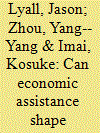

|
|
|
|
|
| Summary/Abstract |
Governments, militaries, and aid organizations all rely on economic interventions to shape civilian attitudes toward combatants during wartime. We have, however, little individual-level evidence that these “hearts and minds” programs actually influence combatant support. We address this problem by conducting a factorial randomized control trial of two common interventions—vocational training and cash transfers—on combatant support among 2,597 at-risk youth in Kandahar, Afghanistan. We find that training only improved economic livelihoods modestly and had little effect on combatant support. Cash failed to lift incomes, producing a boom-and-bust dynamic in which pro-government sentiment initially spiked and then quickly reversed itself, leaving a residue of increased Taliban support. Conditional on training, cash failed to improve beneficiaries’ livelihoods but did increase support for the Afghan government for at least eight months after the intervention. These findings suggest that aid affects attitudes by providing information about government resolve and competence rather than by improving economic livelihoods.
|
|
|
|
|
|
|
|
|
|
|
|
|
|
|
|
| 2 |
ID:
171340
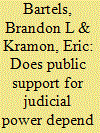

|
|
|
|
|
| Summary/Abstract |
Judicial power is central to democratic consolidation and the rule of law. Public support is critical for establishing and protecting it. Conventional wisdom holds that this support is rooted in apolitical factors and not dependent on who is in political power. By contrast, we argue that support may be driven by instrumental partisan motivations and therefore linked to partisan alignment with the executive. We test the argument with survey evidence from 34 African countries. To provide causal evidence, we conduct difference-in-differences analyses leveraging Ghana’s three presidential transitions since 2000. Across Africa, support for judicial power is high, while trust in courts is lower. However, presidential co-partisans are less supportive of horizontal judicial power over the president and more supportive of vertical power over the people. The article demonstrates the importance of partisan alignment with the executive in shaping support for judicial power, with implications for judicial behavior and legitimacy.
|
|
|
|
|
|
|
|
|
|
|
|
|
|
|
|
| 3 |
ID:
171347


|
|
|
|
|
| Summary/Abstract |
Although the majority of research on revolving-door lobbyists centers on the influence they exercise during their postgovernment careers, relatively little attention is given to whether future career concerns affect the behaviors of revolving-door lobbyists while they still work in government. We argue that the revolving-door incentivizes congressional staffers to showcase their legislative skills to the lobbying market in ways that affect policymaking in Congress. Using comprehensive data on congressional staffers, we find that employing staffers who later become lobbyists is associated with higher legislative productivity for members of Congress, especially in staffers’ final terms in Congress. It also is associated with increases in a member’s bill sponsorship in the areas of health and commerce, the topics most frequently addressed by clients in the lobbying industry, as well as granting more access to lobbying firms. These results provide the systematic empirical evidence of pre-exit effects of the revolving-door among congressional staff.
|
|
|
|
|
|
|
|
|
|
|
|
|
|
|
|
| 4 |
ID:
171332


|
|
|
|
|
| Summary/Abstract |
Inspired by impossibility theorems of social choice theory, many democratic theorists have argued that aggregative forms of democracy cannot lend full democratic justification for the collective decisions reached. Hence, democratic theorists have turned their attention to deliberative democracy, according to which “outcomes are democratically legitimate if and only if they could be the object of a free and reasoned agreement among equals” (Cohen 1997a, 73). However, relatively little work has been done to offer a formal theory of democratic deliberation. This article helps fill that gap by offering a formal theory of three different modes of democratic deliberation: myopic discussion, constructive discussion, and debate. We show that myopic discussion suffers from indeterminacy of long run outcomes, while constructive discussion and debate are conclusive. Finally, unlike the other two modes of deliberation, debate is path independent and converges to a unique compromise position, irrespective of the initial status quo.
|
|
|
|
|
|
|
|
|
|
|
|
|
|
|
|
| 5 |
ID:
171346


|
|
|
|
|
| Summary/Abstract |
Over the past two decades, there has been a marked increase in partisan social polarization, leaving scholars in search of solutions to partisan conflict. The psychology of intergroup relations identifies empathy as one of the key mechanisms that reduces intergroup conflict, and some have suggested that a lack of empathy has contributed to partisan polarization. Yet, empathy may not always live up to this promise. We argue that, in practice, the experience of empathy is biased toward one’s ingroup and can actually exacerbate political polarization. First, using a large, national sample, we demonstrate that higher levels of dispositional empathic concern are associated with higher levels of affective polarization. Second, using an experimental design, we show that individuals high in empathic concern show greater partisan bias in evaluating contentious political events. Taken together, our results suggest that, contrary to popular views, higher levels of dispositional empathy actually facilitate partisan polarization.
|
|
|
|
|
|
|
|
|
|
|
|
|
|
|
|
| 6 |
ID:
171344


|
|
|
|
|
| Summary/Abstract |
Is local law enforcement conducted differently based on the party in power? I offer an answer to this question by focusing on a case in which law enforcement is elected and has meaningful independent discretion: sheriff compliance with federal requests to detain unauthorized immigrants. Using a regression discontinuity design in a new dataset of over 3,200 partisan sheriff elections and administrative data on sheriff behavior, I find that Democrats and Republicans comply at nearly the same rate. These results contribute to ongoing research into the role that partisanship plays in local policy making, indicating that law enforcement officers make similar choices across party lines even when they have broad authority. I also present evidence that sheriffs hold more similar immigration enforcement views across party than the general public, highlighting the role of candidate entry and selection in determining the level of partisan polarization.
|
|
|
|
|
|
|
|
|
|
|
|
|
|
|
|
| 7 |
ID:
171338
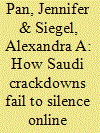

|
|
|
|
|
| Summary/Abstract |
Saudi Arabia has imprisoned and tortured activists, religious leaders, and journalists for voicing dissent online. This reflects a growing worldwide trend in the use of physical repression to censor online speech. In this paper, we systematically examine the consequences of imprisoning well-known Saudis for online dissent by analyzing over 300 million tweets as well as detailed Google search data from 2010 to 2017 using automated text analysis and crowd-sourced human evaluation of content. We find that repression deterred imprisoned Saudis from continuing to dissent online. However, it did not suppress dissent overall. Twitter followers of the imprisoned Saudis engaged in more online dissent, including criticizing the ruling family and calling for regime change. Repression drew public attention to arrested Saudis and their causes, and other prominent figures in Saudi Arabia were not deterred by the repression of their peers and continued to dissent online.
|
|
|
|
|
|
|
|
|
|
|
|
|
|
|
|
| 8 |
ID:
171333
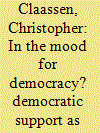

|
|
|
|
|
| Summary/Abstract |
Public support has long been thought crucial for the vitality and survival of democracy. Existing research has argued that democracy also creates its own demand: through early-years socialization and later-life learning, the presence of a democratic system coupled with the passage of time produces widespread public support for democracy. Using new panel measures of democratic mood varying over 135 countries and up to 30 years, this article finds little evidence for such a positive feedback effect of democracy on support. Instead, it demonstrates a negative thermostatic effect: increases in democracy depress democratic mood, while decreases cheer it. Moreover, it is increases in the liberal, counter-majoritarian aspects of democracy, not the majoritarian, electoral aspects that provoke this backlash from citizens. These novel results challenge existing research on support for democracy, but also reconcile this research with the literature on macro-opinion.
|
|
|
|
|
|
|
|
|
|
|
|
|
|
|
|
| 9 |
ID:
171345
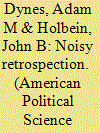

|
|
|
|
|
| Summary/Abstract |
Retrospective voting is vital for democracy. But, are the objective performance metrics widely thought to be relevant for retrospection—such as the performance of the economy, criminal justice system, and schools, to name a few—valid criteria for evaluating government performance? That is, do political coalitions actually have the power to influence the performance metrics used for retrospection on the timeline introduced by elections? Using difference-in-difference and regression discontinuity techniques, we find that US states governed by Democrats and those by Republicans perform equally well on economic, education, crime, family, social, environmental, and health outcomes on the timeline introduced by elections (2–4 years downstream). Our results suggest that voters may struggle to truly hold government coalitions accountable, as objective performance metrics appear to be largely out of the immediate control of political coalitions.
|
|
|
|
|
|
|
|
|
|
|
|
|
|
|
|
| 10 |
ID:
171334
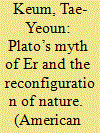

|
|
|
|
|
| Summary/Abstract |
Why did Plato conclude the Republic, arguably his most celebrated work of political theory, with the Myth of Er, an obscure story of indeterminate political-theoretical significance? This paper advances a novel reading of the Myth of Er that attends to the common plot that it shares with two earlier narrative interludes in the Republic. It suggests that Plato constructed the myth as an account of a search, akin to the sorting of potential philosopher-kings that underwrites the kallipolis’ educational curriculum, for natures that have successfully absorbed the cumulative effects of their philosophical upbringing. The model of nature presented in the myth, in turn, helps us approach the category of nature as a working concept: we can recognize contexts in which it is useful to assume in otherwise complex and fluid individuals a fixed, indelible nature, while granting that our sense of what that consists in is subject to revision.
|
|
|
|
|
|
|
|
|
|
|
|
|
|
|
|
| 11 |
ID:
171343


|
|
|
|
|
| Summary/Abstract |
Racial inequality in voter turnout is well-documented, but we know less about racial inequality in campaign contributions. Using new data on the racial identities of over 27 million donors, we find an unrepresentative contributor class. Black and Latino shares of contributions are smaller than their shares of the population, electorate, and elected offices. However, we argue that the presence of ethnoracial minority candidates mobilizes coethnic donors. Results from regression discontinuity and difference-in-difference designs suggest that the presence of ethnoracial minority candidates increases the share of minority contributions in US House elections. We find a reduction in white contributions to black Democrats, and to black and Latino Republicans, but little difference in overall fundraising competitiveness. Although we cannot definitively rule out alternative mechanisms that covary with candidate ethnorace, the results suggest that the nomination of minority candidates can increase the ethnoracial representativeness of campaign finance without costs to fundraising.
|
|
|
|
|
|
|
|
|
|
|
|
|
|
|
|
| 12 |
ID:
171337
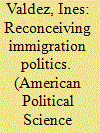

|
|
|
|
|
| Summary/Abstract |
This article theorizes the circulation of violence in the realms of immigration and labor. Through Walter Benjamin, I conceptualize the relationship between racial violence and law, and note that although violence can support the authority of law, excessive violence makes law vulnerable to decay. This tension between authority and excess is eased by humanitarianism. I find clues for disrupting this circulation in Benjamin’s twin notions of the real state of exception and the general strike, introduced two decades apart and invested in theorizing how labor and other marginalized groups threaten the stability of law supported by violence. This reconstruction proceeds alongside an examination of the contemporary US regime of immigration enforcement, which combines the excessive violence of detention and deportation with marginal humanitarian adjustments, which ultimately legitimate violence. On the disruptive side, a Benjaminian reading of labor activism by the Coalition of Immokalee Workers offers three dimensions of emancipatory politics: (a) practices of refusal (to engage on the terms of the immigration debate), (b) the establishment of historical constellations (of racial regulation of labor constitutive of law), and (c) divine violence (through exposure of lawful violence in the food production chain).
|
|
|
|
|
|
|
|
|
|
|
|
|
|
|
|
| 13 |
ID:
171331


|
|
|
|
|
| Summary/Abstract |
Epistocratic arrangements are widely rejected because there will be reasonable disagreement about which citizens count as epistemically superior and an epistemically superior subset of citizens may be biased in ways that undermine their ability to generate superior political outcomes. The upshot is supposed to be that systems of democratic government are preferable because they refuse to allow some citizens to rule over others. We show that this approach is doubly unsatisfactory: although representative democracy cannot be defended as a form of government that prevents some citizens from ruling over others, it can be defended as a special form of epistocracy. We demonstrate that well-designed representative democracies can, through treatment and selection mechanisms, bring forth an especially competent set of individuals to make public policy, even while circumventing the standard objections to epistocratic rule. This has implications for the justification of representative democracy and questions of institutional design.
|
|
|
|
|
|
|
|
|
|
|
|
|
|
|
|
| 14 |
ID:
171336


|
|
|
|
|
| Summary/Abstract |
This article theorizes the colonial problem of peoplehood that Indian anticolonial thinkers grappled with in their attempts to conceptualize self-rule, or swaraj. British colonial rule drew its legitimacy from a developmentalist conception of the colonized people as backward and disunited. The discourse of “underdeveloped” colonial peoplehood rendered the Indian people “unfit” for self-government, suspending their sovereignty to an indefinite future. The concept of swaraj would be born with the rejection of deferred colonial self-government. Yet the persistence of the developmentalist figuration of the people generated a crisis of sovereign authorization. The pre-Gandhian swaraj theorists would be faced with the not-yet claimable figure of the people at the very moment of disavowing the British claim to rule. Recovering this underappreciated pre-Gandhian history of the concept of swaraj and reinterpreting its Gandhian moment, this article offers a new reading of Gandhi's theory of moral self-rule. In so doing, it demonstrates how the history of swaraj helps trace the colonial career of popular sovereignty.
|
|
|
|
|
|
|
|
|
|
|
|
|
|
|
|
| 15 |
ID:
171342
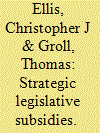

|
|
|
|
|
| Summary/Abstract |
We analyze the strategic considerations inherent in legislative subsidies and develop an informational lobbying model with costly policy reforms. In contrast to other models of informational lobbying, we focus on the implications of a policymaker’s and a lobby’s resource constraints for lobbying activities. We allow both a policymaker and a lobby to gather information, and each can either fund or subsidize policymaking. Our analysis highlights that legislative subsidies are both chosen strategically by lobbyists and strategically induced by policymakers, dependent on the circumstances. These involve which resource constraints bind the policymaker’s prior beliefs, the salience of policy, and the policymaker’s and lobby’s expertise in information gathering. Our results highlight five distinct motives for informational lobbying and demonstrate that for both a lobby and policymaker, there can be strategic advantages arising from being resource-constrained.
|
|
|
|
|
|
|
|
|
|
|
|
|
|
|
|
| 16 |
ID:
171341


|
|
|
|
|
| Summary/Abstract |
We clarify the theoretical foundations of partisan fairness standards for district-based democratic electoral systems, including essential assumptions and definitions not previously recognized, formalized, or in some cases even discussed. We also offer extensive empirical evidence for assumptions with observable implications. We cover partisan symmetry, the most commonly accepted fairness standard, and other perspectives. Throughout, we follow a fundamental principle of statistical inference too often ignored in this literature—defining the quantity of interest separately so its measures can be proven wrong, evaluated, and improved. This enables us to prove which of the many newly proposed fairness measures are statistically appropriate and which are biased, limited, or not measures of the theoretical quantity they seek to estimate at all. Because real-world redistricting and gerrymandering involve complicated politics with numerous participants and conflicting goals, measures biased for partisan fairness sometimes still provide useful descriptions of other aspects of electoral systems.
|
|
|
|
|
|
|
|
|
|
|
|
|
|
|
|
| 17 |
ID:
171335
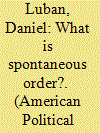

|
|
|
|
|
| Summary/Abstract |
Due especially to the work of Friedrich Hayek, “spontaneous order” has become an influential concept in social theory. It seeks to explain how human practices and institutions emerge as unintended consequences of myriad individual actions, and points to the limits of rationalism and conscious design in social life. The political implications of spontaneous order theory explain both the enthusiasm and the skepticism it has elicited, but its basic mechanisms remain elusive and underexamined. This article teases out the internal logic of the concept, arguing that it can be taken to mean several different things. Some are forward-looking (defining it in terms of present-day functioning), whereas others are backward-looking (defining it in terms of historical origins). Yet none of these possibilities prove fully coherent or satisfactory, suggesting that spontaneous order cannot bear the analytical weight that has been placed on it.
|
|
|
|
|
|
|
|
|
|
|
|
|
|
|
|
|
|
|
|
|